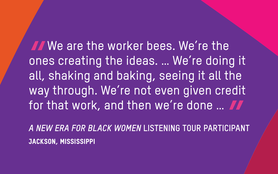Extreme income inequality and structural racism still limit the economic mobility of Black women in the US.
Women’s History Month is in full swing, and I find myself reflecting on the lives of the women who have shaped my world. Women like my mother, who—between caregiving and work for pay—barely had time to rest. And activists like Fannie Lou Hamer, the Mississippi sharecropper turned civil rights icon.
Fannie was the vice chair of the Freedom Democratic Party, and at the 1964 Democratic National Convention, she made a fiery speech about the conditions of Blacks in the Jim Crow South and the terror and intimidation they were facing for trying to exercise their civil rights.
Fannie was from Mississippi and my mother was from Haiti, but they shared a common reality: every day of their lives was permeated with sexism and racism and was harder and more dangerous than it should have been.
UNDERPAID AND UNDERVALUED
Black women in the US work hard, and they always have. In fact, this demographic leads all women in workforce participation, and Black wives are significantly more likely than wives from other racial or ethnic groups to be the breadwinners in their marriages.
But deprived of opportunities, far too many are trapped in low-wage jobs: half of working women of color earn less than $15 an hour. Without decent incomes or benefits, Black women are disproportionally saddled with limits on their access to quality and affordable childcare, housing, healthcare, paid leave, savings for a rainy day or retirement, schools, and clean air and water.
Which means Black women’s futures—and their children’s futures—are being undermined every single day.
Of course, there are wealthy exceptions. But sometimes the financial success of a few is weaponized to make poor women feel bad that they haven’t been able to pull themselves up by their proverbial bootstraps—denying the reality that Black women can’t achieve fame and fortune without a lot of luck and a lot of help.
But even those who’ve joined the ranks of the one percent experience discrimination. Taraji Henson, who starred in the recent remake of The Color Purple, has talked openly about the pay gap she has experienced as a Black woman throughout her career, and the mental toll of having to constantly fight for what she deserves.
“I’m just tired of working so hard, being gracious at what I do, being paid a fraction of the cost,” she said in an interview, through tears. “I’m tired of hearing my sisters say the same thing over and over.”
She captured the cruel and collective truth that Black women’s labor at all levels of the economic ladder is underpaid and undervalued in the workplace, and it resonated deeply: her comments immediately went viral on social media.
THE OPPORTUNITY TO THRIVE
Race and place still determine what opportunities are afforded in life. Access to family-sustaining incomes, good job benefits, security, generational wealth, a healthy living environment, equitable schools, and respectful treatment when they speak their minds may be everyone’s right, but it’s not everyone’s reality.
For years, Oxfam has been working in Louisiana and Mississippi, states that consistently rank near the bottom for labor policies for working families. Here, workers are squeezed with too few resources and opportunities for upward mobility. Now, we’re expanding to North Carolina and Georgia. Our focus is on helping communities fight back against injustice and inequality—with Black women at the center.
Our initiative, A New Era for Black Women, puts a spotlight on Black female low-wage earners, and on helping them gain access to the halls of Congress and other critical spaces for advocacy and influence.
What do Black women deserve? The opportunity to thrive—not just survive. Everywhere.
WHAT YOU CAN DO
Make your voice heard in support of legislation that will improve conditions for ALL women, including
- the Paycheck Fairness Act, which would enhance equal-pay protections and require salary transparency; and
- the Raise the Wage Act, which would raise the federal minimum wage from $7.25 to $17 by 2028, and eliminate subminimum wages (such as restaurants pay tipped workers), which depress women’s incomes and make them vulnerable to sexual harassment.
History hasn’t been kind to women—Black women in particular—and as individuals there’s little anyone can do to alter its course. But in solidarity with one another, the sky may be the only limit. Join us.



